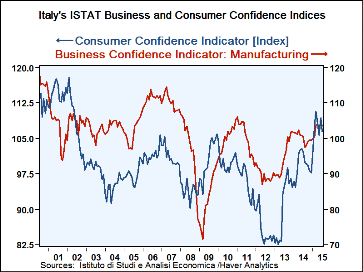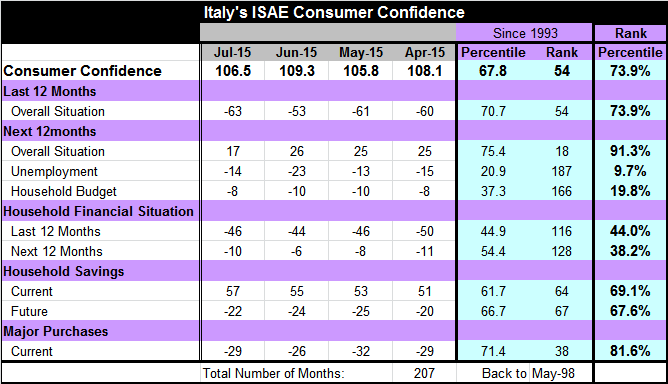 Global| Jul 28 2015
Global| Jul 28 2015Italian Consumer Confidence Continues Its Erratic Move Lower
Summary
Italy's economy is still under a great deal of pressure. While it has a large number of people wanting work, the number looking for work (a key ILO statistic to be considered unemployed) has dropped off sharply. It is not surprising [...]
 Italy's economy is still under a great deal of pressure. While it has a large number of people wanting work, the number looking for work (a key ILO statistic to be considered unemployed) has dropped off sharply. It is not surprising to see that consumer confidence too is dropping off. Still, the consumer confidence survey- quite apart from any ILO measure- shows that the fear of unemployment in Italy continues to dissipate.
Italy's economy is still under a great deal of pressure. While it has a large number of people wanting work, the number looking for work (a key ILO statistic to be considered unemployed) has dropped off sharply. It is not surprising to see that consumer confidence too is dropping off. Still, the consumer confidence survey- quite apart from any ILO measure- shows that the fear of unemployment in Italy continues to dissipate.
The level of the consumer confidence index in July, at 106.5, stands in the 73.9 percentile of its historic queue of data. That is a moderately firm reading. Among the components that make up this index, three categories have standings higher than the overall index and are pulling it higher. They are (1) the assessment of the overall situation over the next 12 months (a 91.3 percentile standing), (2) unemployment prospects which stand in the 9.7 percentile (or the 90.3 percentile when converted to a `good' index, from a `bad' index), and (3) the current situation to make a major purchase (at an 81.6 percentile standing).
The current assessment of the overall situation has a 73.9 percentile standing, the same as the overall index.
However, still dragging the index lower are a number of categories. The 19.8 percentile standing for the household budget is a depressant. The household financial situation is assessed as being in its 44th percentile over the last 12 months and is only in its 38th percentile as expected for the next 12 months. Whatever improvement in the overall situation is expected, it is not expected to improve the household financial situation. Additionally, the two household savings measures each reside below their respective 70th percentile levels.
Italian consumer confidence is in a region that marks it as higher over the past few months than it has been since about 2003. Prior to that, the level of confidence had been much higher. Putting this month's reading aside, Italian confidence over the past several months does mark a recent high-mark of sorts. However, compared to a broader history (which is what the percentile standings show us), consumer confidence in Italy is still quite moderate.
Both Italian business and consumer confidence indicators have been moving higher in recent months, but neither index has an impressive historic standing. Over the past few months, neither has impressive momentum. For the moment, all the attention in the EMU is on Greece. There has been some spillover attention on Spain (where Podemos, an anti-austerity party had been relatively popular) and on Portugal.
So far Italy has escaped that particular 'limelight.' But as the third largest economy in the EMU and with a struggling economy, Italy is still very much an economy of interest. So is France with a recently reported new high in its unemployment rate. The EMU is not out of the ditch yet and its problems go much deeper than just Greece. And Greece, as it becomes increasingly clear, still has important issues to resolve and it is not rolling over on all EMU demands. While Angela Merkel has seemingly opened the door on the potential for some debt assistance for Greece down the road, she has made it clear that Greece must get a bailout agreement first. Greece, still resisting some creditor demands, wants funds dispersed on recent actions alone as other actions remain in dispute. Do not kid yourself. The real `moment of truth' for Greece and the EMU lies ahead. Depending on its outcome, Spain, Portugal and Italy could find themselves with some unwanted scrutiny.

Robert Brusca
AuthorMore in Author Profile »Robert A. Brusca is Chief Economist of Fact and Opinion Economics, a consulting firm he founded in Manhattan. He has been an economist on Wall Street for over 25 years. He has visited central banking and large institutional clients in over 30 countries in his career as an economist. Mr. Brusca was a Divisional Research Chief at the Federal Reserve Bank of NY (Chief of the International Financial markets Division), a Fed Watcher at Irving Trust and Chief Economist at Nikko Securities International. He is widely quoted and appears in various media. Mr. Brusca holds an MA and Ph.D. in economics from Michigan State University and a BA in Economics from the University of Michigan. His research pursues his strong interests in non aligned policy economics as well as international economics. FAO Economics’ research targets investors to assist them in making better investment decisions in stocks, bonds and in a variety of international assets. The company does not manage money and has no conflicts in giving economic advice.
More Economy in Brief
 Global| Feb 05 2026
Global| Feb 05 2026Charts of the Week: Balanced Policy, Resilient Data and AI Narratives
by:Andrew Cates






